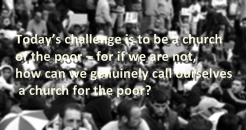 Church of the poor: A fierce heart for people in poverty
Church of the poor: A fierce heart for people in poverty
Republished from Church Action on Poverty Liam Purcell
Inspired by Pope Francis’ vision of “a poor church, for the poor”, Church Action on Poverty is exploring how churches can do more to stand in solidarity with people in poverty.
Here is a reflection by Rachel Lampard, Vice President of the Methodist Conference 2016–17.
John Wesley, one of the founders of Methodism in the 18th century, was uncompromising in his personal commitment to people living in poverty. When asked by a tax official to declare all his silver plate on which he should be paying excise duties, he replied: “Sir. I have two silver teaspoons at London, and two at Bristol. This is all the plate I have at present; and I shall not buy anymore while so many around me want bread.” He really was a man who put his money where his mouth was.
Wesley had a fierce heart for people in poverty and said some things which are deeply challenging to us, to our politics and our Church today.
He said that “
one great reason why the rich, in general, have so little sympathy for the poor, is because they so seldom visit them.” And, by the way, a person was “rich” by Wesley’s standards if they had “
food and raiment sufficient for himself and his family, and something over”. Wesley’s faith was rooted in the often countercultural belief that God’s love was for absolutely everyone, and early Methodism appealed strongly to those who were poorer.
Early Methodism’s roots in the poorest communities led Methodist people to be at the heart of many of the important and empowering social movements of the day – most notably the rise of the Trade Union Movement and campaigns to treat workers fairly and safely.
Through its later history Methodism hasn’t always reflected its early formation. But it has maintained its commitment to challenging poverty. Methodists usually get stuck in – there are over 7,000 examples of local churches around Britain being involved in community projects, many of them supporting people who experience poverty or are marginalised. The Methodist Church is reviewing the grants it offers to ensure that money aimed at poverty and justice projects reflects the reality of poverty in Britain today, where being at once in work and in poverty are increasingly common.
And Methodists believe that Christians are called to challenge structural injustices.
In 2011 we became the first UK denomination to mandate the payment of the Living Wage to church employees. Working with Church partners through the Joint Public Issues Team, the Methodist Church has campaigned against the unjust benefit sanctions regime, spoken out about the truth and lies about poverty, and helped churches to reflect on the challenges presented by the growing number of people using food banks.
In the UK there are 13.7 million people living in poverty and it is estimated that each year over 1 million people experience the most degrading and extreme form of poverty – destitution. Yet very few of these people will attend Methodist churches; fewer will speak in our churches, our synods or our annual Conference.
Today’s challenge is to be a church of the poor – for if we are not, how can we understand the reality of poverty, how can we be challenged by the reality of poverty, how can we base our action on the experience of poverty, and in short how can we genuinely call ourselves a church for the poor?
-----
Retweet about this article:
Liam Purcell, 14/06/2016